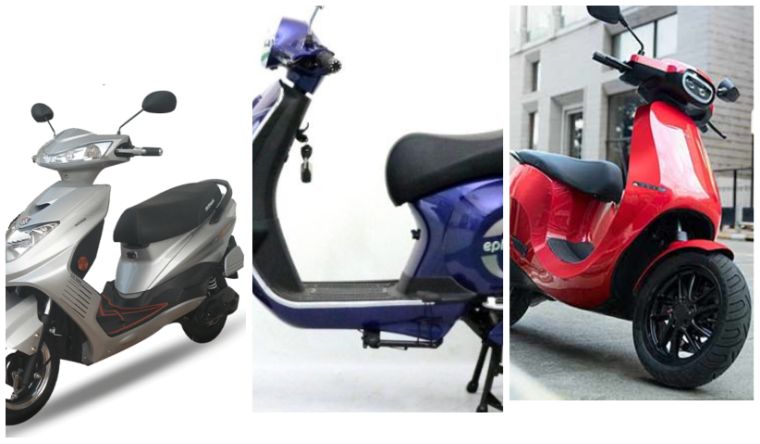Following incidents of fire involving electric two-wheelers, three manufacturers recalled a total of 6,656 electric two-wheelers in April this year, the Lok Sabha was informed on Tuesday.
While responding to a question on the fire incidents, safety of electric vehicles manufactured in India, the Minister of state of heavy industries Krishan Pal Gurjar said incidents of fire in electric vehicles were reported in Tamil Nadu in March and Andhra Pradesh in April. In all these cases, the ministry of road transport and highways (MoRTH) has sent notices to the manufacturers concerned.
Gurjar said Okinawa recalled 3,215 units of vehicles on April 16, Pure EV recalled 2,000 units of vehicles on April 21 and Ola Electric recalled 1,441 units of vehicles on April 23.
“Testing of components for EVs is done as per relevant standards, as specified in Rule 126 of the Central Motor Vehicles Rule, 1989 to ensure compliance. Based on the information of fire incidents available, MoRTH has issued a show cause notice to the CEOs and MDs of the concerned two wheeler electric scooter manufacturers, to explain the reasons as to why the relevant sections of the Motor Vehicles Act should not be invoked against them,” the minister said.
Union transport minister Nitin Gadkari constituted an expert committee consisting of independent experts from DRDO, Indian Institute of Science (IISC) Bengaluru and Naval Science and Technological Laboratory (NSTL) Visakhapatnam.
In another reply, the heavy industries ministry infomed the Parliament that till July 14, a total of 13.3 lakh (13,34,385) electric vehicles have ben registered in the contry till July 14 —Uttar Pradesh 3,37,180 (25.2%), Delhi 1,56,393 and Karnataka 1,20,532.
Under the FAME-I (Faster adoption and manufacturing of hybrid and electric vehicles) scheme, 520 EV charging stations have sanctioned by the ministry of heavy industries. 479 have already been installed till July 1. Of these 81 charging stations have been opened on the Delhi-Chandigarh, Mumbai-Pune, Delhi-Jaipur-Agra and Jaipur-Delhi routes.
Under FAME-II, the ministry sanctioned 2,877 EV stations in 68 cities across 25 states/UTs, of which only 50 charging stations have come up till July 1.
Optimised voltage control
Researchers at the Indian Institute of Technology, Guwahati have developed optimised control schemes for active power distribution networks that can enable coordinated operation of photovoltaic power generation and electric vehicle charging stations.
"We have developed an optimisation-based coordinated voltage control approach of power distribution networks to mitigate the overvoltage and under-voltage problems due to high PV generation and high EV charging, respectively. The research team has developed a three-stage model predictive control (MPC) approach to schedule charging of EVs and other devices," said Sanjib Ganguly, Associate Professor, Department of Electronics and Electrical Engineering (EEE), IIT Guwahati.
"EV charging is uncoordinated at present, which leads to under-voltage of the distribution networks, and associated efficiency loss, they said. A coordinated control approach for power distribution system is required in order to derive maximum benefits from renewable power generation and electric vehicle power sourcing. PV and EV inverters need to work in coordination with other Voltage Regulating Devices (VRD) to regulate the system voltages," Ganguly said.
The three stages involve---coordination of the volt-var devices in two different time scales, reception of the reactive power setpoints by the local controller, and EV charge scheduling in accordance with the balance between the operating cost and customer satisfaction.
"Our three-stage model helps in maintaining bus voltage magnitudes and state-of-charge (SOC) of EV battery within safe limits with minimal usage of control resources and cost of electricity consumption," said research scholar Arunima Dutta.
The approach developed by the IIT Guwahati team also provides a framework for the transition from passive power distribution to active. Both solar power generation and EV can enable the transition of power distribution from a passive state (unidirectional flow of power from the grid to the consumer), to an active system wherein there is bidirectional flow of power from the grid to the point of use, and vice versa.
"For example, while the grid-to-vehicle (G2V) model is pretty straightforward, wherein a vehicle is charged by power supplied by a grid, the reverse vehicle-to-grid (V2G) enables energy to be pushed back to the power grid from the battery of an electric car.
"The model developed by us provides a framework of optimal G2V and V2G operation of EVs by keeping the voltages of each node of a distribution network within allowable upper and lower limits. The charging/discharging of EVs is optimally scheduled with respect to the real-time electricity pricing," said another researcher Chandan Kumar.
Aluminium air batteries for Electric Vehicles
Leading Indian and Israeli companies have teamed up to create cutting edge aluminium-air batteries for Electric Vehicles that could make its adoption easier in India by extending its driving range without the need for charging infrastructure, reduce battery imports, and also give a boost to the Atmanitbhar Bharat initiative by enhancing energy security.
Aluminium-air batteries are expected to make EV adoption more convenient, and accelerate the transition to zero emission mobility. Due to its light weight and high energy density, an Aluminium-Air battery significantly increases the driving range of Electric Vehicles. It also enables quick refuelling' and eliminates the need for expensive nationwide charging networks, the press release said
Aditya Birla Group's metal flagship, Hindalco, has signed an MoU with Phinergy, a leading Israel-based pioneer in metal-air battery technology, and IOC Phinergy Private Limited (IOP) - a joint venture between Phinergy and Indian Oil Corporation, to create aluminium-air batteries for electric vehicles (EVs), a joint press release by the companies said on Monday.
According to the MOU, Phinergy and IOP will partner exclusively with Hindalco in India on R&D and pilot production of aluminium plates for Aluminium-Air batteries, and recycling of aluminium, after usage in these batteries.
In the Aluminium-Air battery, developed by Phinergy, energy is released when aluminium reacts with oxygen in ambient air to produce aluminium hydroxide.
(With inputs from agencies)
.




